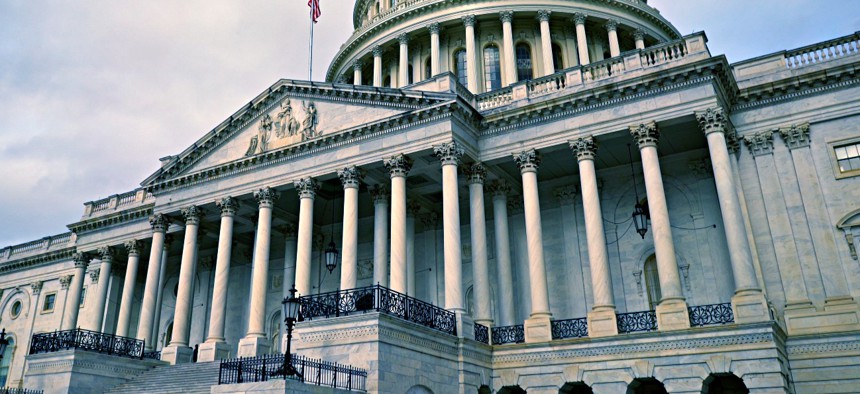
The plan was unveiled by House Speaker Kevin McCarthy earlier this week. ANDREY DENISYUK / Getty Images
Agencies Would Suffer 'Egregious Harm' Under GOP Debt Ceiling Proposal, Federal Employee Union Says
House Republicans’ plan to raise the debt ceiling in conjunction with a 20% cut in discretionary spending would hurt public services, AFGE says.
The nation’s largest union of federal employees on Wednesday blasted House Republicans’ proposal to lift the debt ceiling in exchange for slashing discretionary spending at domestic agencies to their fiscal 2022 levels, arguing it would cause “egregious harm” to both federal agencies and the people they serve.
House Speaker Kevin McCarthy this week unveiled his caucus’s opening bid in negotiations with Democrats and the White House on how to avert defaulting on the national debt, which amounts to cuts of more than 20% to domestic discretionary spending, arguing that lawmakers must cut the “overgrown bureaucracy” at federal agencies. President Biden and congressional Democrats have insisted that any increase to the debt ceiling must be “clean” and that talks over spending levels cannot be tied to the debt limit.
In a letter to every House lawmaker, American Federation of Government Employees Legislative Director Julie Tippens lambasted McCarthy’s proposal as misguided and misdirected.
“As career federal workers, our members recognize the importance of responsible fiscal management,” she wrote. “Our members support prudent budgetary and tax policies to ensure that the federal government can continue to meet public needs in the future. At the same time, we should recognize that the government’s recent large deficits primarily result from large-scale COVID-19 relief programs that were designed to shore up the private sector economy and were enacted without tax increases to defray their costs.”
Tippens countered McCarthy’s accusations that the federal bureaucracy is “bloated,” noting that the federal workforce is at a 60-year low, despite a growing population and expanding responsibilities.
“Deficits are not the result of growth in federal agencies in employment; federal civilian employment remains less than it was in the 1960s, although the U.S. population has nearly doubled,” Tippens wrote. “Federal workers have continued to maintain public safety and provide public service throughout the pandemic, even as their wages have lagged behind inflation and continued to trail the private sector.”
The union highlighted a number of ways federal agencies have warned their service would deteriorate if subjected to such drastic cuts in funding. The Social Security Administration, which already suffers from understaffing and underfunding and is a frequent target of Republican attacks on telework, said it would need to close field offices and reduce hours, increasing wait times for disability determinations by 30%.
“The [Agriculture Department] forecasts $250 million in cuts to the Food Safety and Inspection Service, whose inspectors work tirelessly inside factories to prevent foodborne illness,” Tippens wrote. “Since federal law requires food inspection, the department predicts a collateral effect on food production, costing the food industry up to $400 billion or more and presumably increasing already high food prices.”
The Transportation Department warned that McCarthy’s plan would force the agency to lay off “at least 175 personnel, including upwards of 75 railroad safety inspectors.” And the Transportation Security Administration said the proposal would lead to furloughs and wait times to go through airport security increasing to more than two hours, as well as derail the administration’s efforts to boost compensation for the chronically underpaid workforce to an equivalent of what they would receive under the General Schedule pay system.
“These are but a few examples of the myriad harms to the American public that would predictably follow the misnamed ‘Limit, Save, Grow Act,’” Tippens wrote. “AFGE urges you to oppose this bill and to support an immediate increase in the debt ceiling to avoid a default, and then to engage in a necessary bipartisan discussion of future budgetary policy.”







